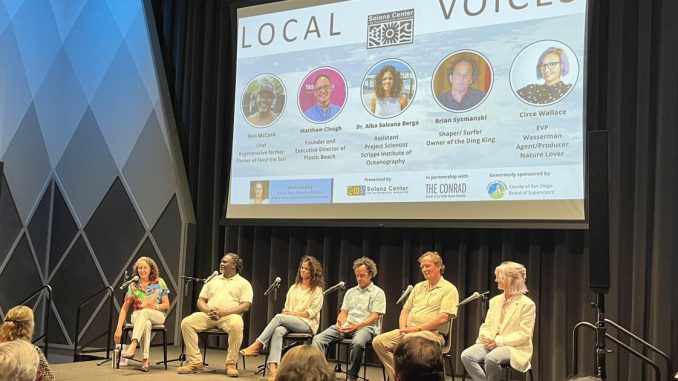
The Encinitas-based Solana Center for Environmental Innovation hosted a “Local Voices” panel discussion about the climate crisis on June 6 in La Jolla, ranging from the consequences of pollution to positive steps everyone can start taking to avert global disaster.
Much of the conversation, which was held at the JAI at the Conrad on Faye Avenue, focused on the grim realities of pollution. But it also included reasons for optimism and the small changes in your daily habits that can make a difference.
Circe Wallace, executive vice president at the Wasserman agency, added that “the more you peel back the onion, the more you discover how scary and overwhelming it is.
“How can we deconstruct those a little bit in our everyday lives so at least I know I’m putting less in the landfill and buying from the local farmstand?” said Wallace, describing habits she’s adopted such as buying clothes from thrift stores and using reusable cups. “Because those are the things I can teach my children.”
Alba Solsona Berga, an assistant project scientist at Scripps Institution of Oceanography, reiterated the need to address daily habits that create additional waste and, in many cases, pollution.
“Think of how many packages you’re going to order this week from Amazon,” she said. “Can you reduce it to just one a month, or even less?”
The event tied into the Solana Center’s efforts to prevent organic waste, save rainwater, and offer other programs and services to help residents and businesses be more environmentally conscious.
Jessica Toth, Solana Center executive director and the moderator of the panel discussion, said that the event was designed to give people “tools necessary to make impactful, concrete changes in their day-to-day lives.”
Matthew Clough, another panelist, founded the nonprofit Plastic Beach to encourage the recycling of plastics, which he said creates an often “invisible problem.” Most people don’t see the plastic that is used to get products on the shelves at local businesses, for example, or think about what happens to that plastic after it is discarded.
Brian Syzmanski, owner of surfboard repair shop Ding King in Encinitas, echoed that point when describing a surf trip he took to Indonesia, where one of the beaches he visited was covered in plastic waste.
“We need to kind of slow down the plastic so that these empty beaches everywhere in the world aren’t going to just gather it and never get cleaned,” he said.
Ron McCord, owner of Feed the Soil, said people should plant something.
“Anytime you leave bare earth undisturbed, something tries to grow there,” McCord said.
Visit www.solanacenter.org for more information on the Solana Center for Environmental Innovation.










